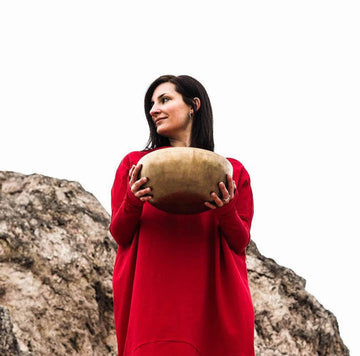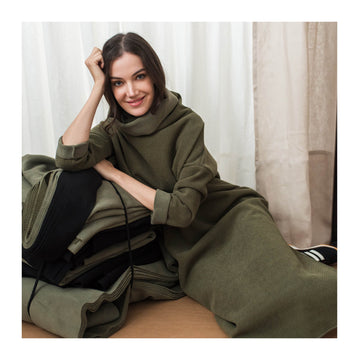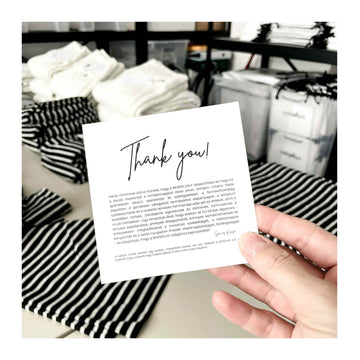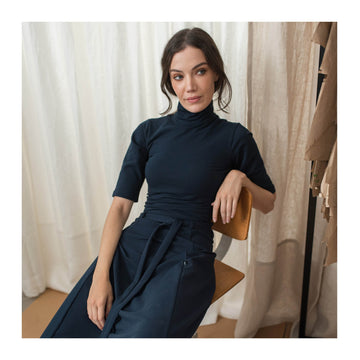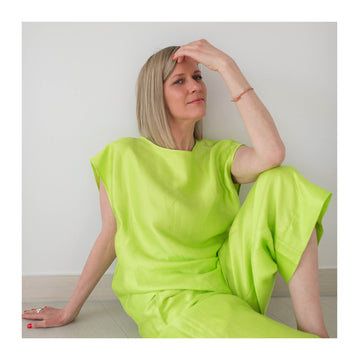Dóri Gazdag works as a yoga instructor, her profession is actually her lifestyle: she is present in yoga classes and in everyday moments with the same consistent and loving awareness. Dóri selected her favorite pieces from the styles of our seasonal BASIC collection, and in the meantime we talked about the path to yoga, harmony and the golden mean. Welcome to our interview, illustrated by the pictures of Veronika Szász.
- How did you become a yoga teacher and why did you choose this profession?
- Somehow yoga found me. Although I had already read András Feldmár's Rainbow of States of Consciousness when I was 18, and I had many questions about my existence, I was more interested in Western psychology at that time. I don't come from a religious, spiritual background, so everything from that direction reached me later. Of course, I was also interested in yoga, and for example, there was a channel at the time that always showed half an hour of yoga in the morning, which I loved. I went for a couple of hours, but then I started working and partying a lot, going to festivals, which apparently kept me busy, although in retrospect it was more of a waste of time. Then a nice acquaintance started talking about the Bhaktivedanta Theological College , where he was attending at the time, showed me pictures of their trips to India, and that's when I started to feel a strong calling. I left ELTE there and went to enroll at the BHF in 2009. I simply knew then that this was what one always waits for. The direction, the faith and trust, even unseen, that this would be something very real that would define my future.

- Which of the different styles of yoga are close to you and why?
- I studied classical hatha yoga for three years in college, but then ashtanga caught my attention the most. I still study it to this day. Many people are scared of it because there are urban legends circulating about how difficult this type of yoga is. I would rather put it this way: it is the most complex system in yoga and I love how this complexity, and even complexity at the beginning, affects the life of the practitioner. I love how the tangled threads start to unravel and clear, clean paths are created. Whether it is an asana that seems difficult, where you really almost tie yourself up, but if you practice persistently, you will suddenly get the feel for the movement, find a way to perform it and from then on it will not be difficult, but the greatest joy is that you finally succeeded. But it can also be about everyday life. How the impossible will one day become reality.

- What is singing bowl therapy, how does it work?
- Just as our existence is built up, singing bowls have the same effect. They affect the level of the gross physical body, just as the bowls are placed on the body. They literally vibrate through your feet to the top of your head. Then they also affect the subtle physical level, that is mentally, because its sound is beautiful, pleasant, it calms you. And most importantly, it also affects the soul level. It creates balance. I like to say that it is like a passive meditation. You can even sleep during it, but a process and effect will still be created as if you had meditated for an hour.

- What is most important to you in your profession and how does it create unity with other areas of your life?
- The surrender. Usually, in the beginning, everyone starts to deal with different self-knowledge techniques because of themselves, because they too have a blockage in their life that they cannot solve. I think that is why psychologists, kinesiologists, and coaches also start to learn the profession. In fact, I just read an interview with Gábor Reisz, the director of Rossz versek , and he also told me that filming a film was actually a trauma processing for him too. So this appears in many professions. Many people start to deal with yoga for this reason too. But then, if someone does not step out of this "me, myself & I" atmosphere, then I think it will not be a real surrender.

- What does consciousness mean to you and what tools do you think we can use to move towards a more conscious everyday life?
- I always ask this question from a different angle. Lately, I've been listening to Péter Popper's lectures a lot while traveling and coming and going, and he once asked the question: but where is it written that we MUST ALWAYS be happy? This has been a big concern for me lately. I think that happiness, especially if it depends on external circumstances or people, can only be a temporary and extreme state, just like sadness. So now, for me, awareness lies in being able to maintain a neutral state between the two extremes. And the means of doing so are, of course, practicing yoga, meditation, and keeping my thoughts clean. And, of course, regularity. Unfortunately, it's all worthless if I do everything for a week, but then nothing for 2 months. It's a lifelong decision, experience, and belief that the process works, but only if I operate it myself and don't expect external help.

- How would you describe your own style and what is needed to feel harmonious in your own skin?
- First of all, simplicity. I can be very scattered in my head, but if my environment and the clothes I wear are clean, it helps me concentrate. Whether it's taking care of everyday matters or teaching. It's no coincidence that most yoga styles recommend wearing all-white clothing, as this is the best way to stay focused and also reflects purity. Minimalist clothes are often criticized for being "not feminine enough". But I think it would be important to get out of the tight miniskirt, push-up bra and gel polish madness and the false ideal image instilled by advertisements could finally be replaced by our own image. I know many women who don't dare to go out on the street without makeup, and there are also those whose husbands haven't even seen them without it. You open Instagram and all you see are pictures that have been retouched to perfection. Compared to this, comparisons and placing ourselves in the world usually take place, in a lower position, that I am few, I am ugly, etc. Then all these unnecessary tricks start to pile up on top of this, which many people think are feminine, but I don't think that femininity lies in this. Then, also due to my profession, comfort is an important factor. You don't necessarily have to study anatomy to see that stilettos are not only uncomfortable in the long run, but also unhealthy. Fortunately, I especially like shoes that others consider ugly. I can come up with boots and ugly slippers! Then attention to detail is also important. I really enjoy wearing special jewelry or bags made of unusual materials. And now, considering the aspects of the planet, sustainability is also important. I have very few clothes and shoes. I think three times about what I buy and what quality, because I want to wear it for 5-10 years, not throw away a material that will probably break down in hundreds of years after 2 months, which is why I love wearing NON+'s high-quality clothes.

- Where do you hold yoga classes, where can we meet you in person?
- I teach both group and private classes at the Barkan Yoga Studio in Budaörs.
The photos were taken by Veronika Szász.

